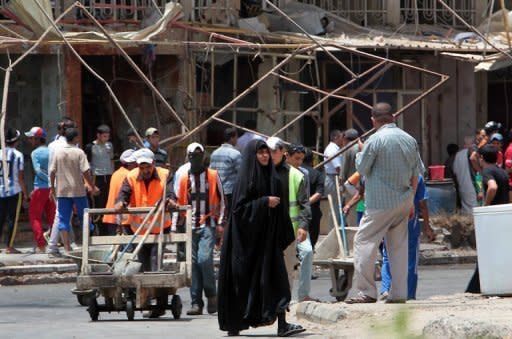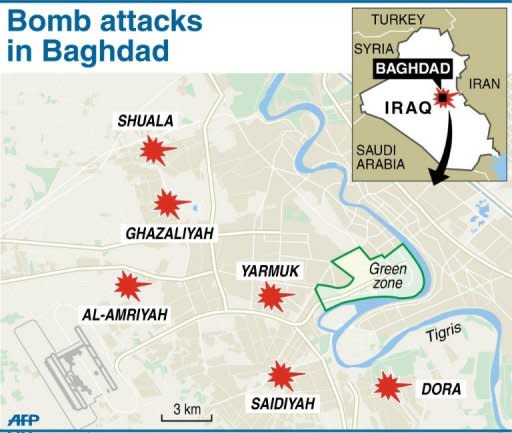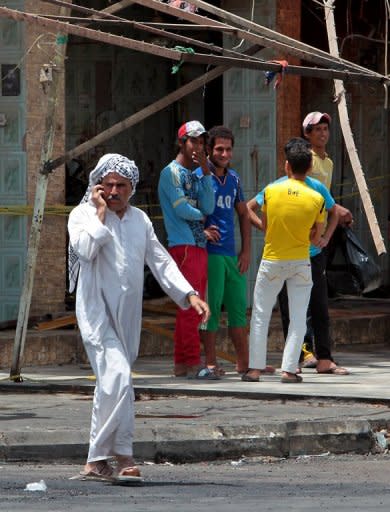Baghdad blasts kill 17, shatter relative calm
A spate of bombings in Baghdad on Thursday killed at least 17 people and wounded dozens more, shattering a relative calm with deadliest violence in the capital in weeks. Roadside bombs and explosives-packed cars detonated across a half-dozen neighbourhoods in the north, south and west of Baghdad, underlining persistent security concerns even as international energy companies met in the centre of the capital to bid on nationwide oil and gas exploration blocks. Overall, 17 people were killed and at least 57 wounded in the attacks, an interior ministry official and two medical sources said. Three others died in shootings in northern Iraq. Thursday's deadliest attack struck in the north Baghdad neighbourhood of Shuala, where a car bomb killed at least 13 people and wounded 32, medical officials said. A police first lieutenant in Shuala said the car was driven by a suicide attacker. The explosion badly damaged nearby shops, and windows in several adjacent buildings were shattered, an AFP journalist reported. Emergency crews were still at the scene more than an hour after the attack along with dozens of tearful residents. "I did not feel anything, but then suddenly I was thrown through the air and I hit a door," said a taxi driver who identified himself only as Abu Qarrar. "I saw dead bodies, wounded people, people with body parts torn off," said the 39-year-old, whose traditional Arab dishdasha robe was stained with blood. "I tried to help some people, and then the ambulances arrived, and now, they are cleaning the streets as if nothing happened." Signs of the attack littered the scene, from a yellow taxi being taken away for examination by police, with its driver's seat and door covered in blood, to an unmarked civilian pick-up truck leaving the neighbourhood with a coffin loaded into its back. Security forces cordoned off the area and tried to stop journalists from speaking to shop-keepers or residents. "When I got here, I saw people crying, and others were beating themselves," in sign of despair, said Qusay Rahi, 31. "I know two brothers who were killed in the explosion. I don't know what they were guilty of, but may God be with them." Separate bombings also struck Al-Amriyah, Ghazaliyah and Yarmuk in west Baghdad, and Dora and Saidiyah in the south of the capital, all on Thursday morning. A magnetic "sticky bomb" Thursday afternoon on Baghdad's southern outskirts, meanwhile, killed one civilian and wounded one other. A series of roadside bombs in Al-Amriyah killed two people and wounded at least seven, officials said, while a car bomb near the Yarmuk home of an official in Prime Minister Nuri al-Maliki's office killed a passerby but the official escaped unharmed. Thursday's violence was the deadliest to hit Baghdad since April 19, when attacks in and around the capital killed 17 people and wounded 106, unrest claimed by Al-Qaeda's front group in Iraq. And in northern Iraq on Thursday, three people were killed in separate attacks in Nineveh province -- one policeman was killed in a firefight with smugglers near the Syrian border, and a police major and his driver were gunned down in the main northern city of Mosul, security officials said. The bombings came on the same day foreign firms gathered in central Baghdad for an auction of energy exploration blocks, a sale that had been hoped to boost Iraq's role as a key global supplier of oil and gas, but which ended with just three of 12 blocks awarded. Violence in Iraq has declined dramatically since its peak in 2006 and 2007, but attacks remain common, especially in Baghdad. A total of 126 Iraqis were killed in violence in April, according to official figures.




